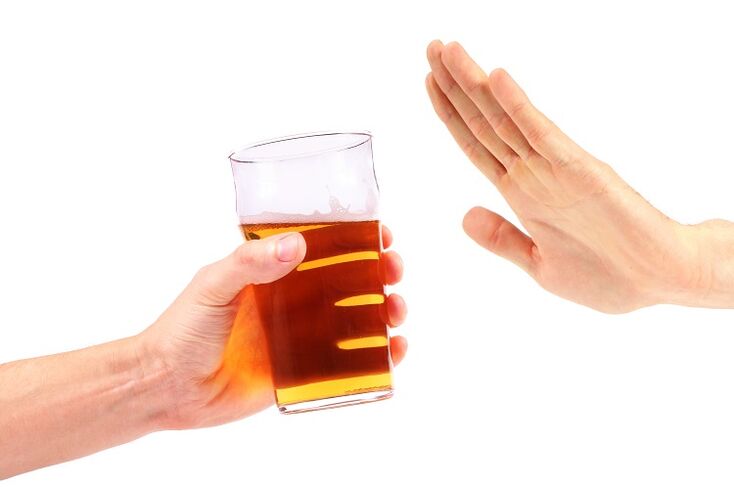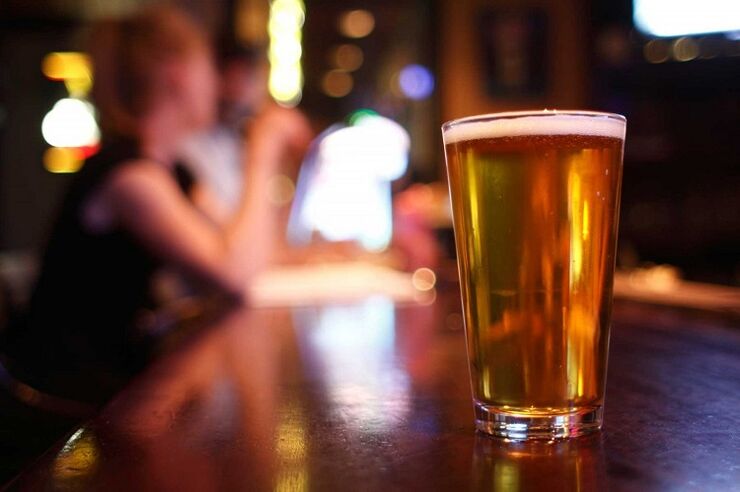At the end of a hard day at work, you want to relax with a glass of wine or a box of beer. Apparently, what happens if you drink alcohol "for pleasure" every day?
The so-called "evening alcoholism" does not cause open dissatisfaction in society. At first glance, there is nothing wrong: there is no syndrome of immediate withdrawal from a glass of vodka. But frequent use of alcohol affects the human body, regardless of the "elite" of drinks. Young, successful people between the ages of 25 and 40, who buy expensive cognac, do not even feel that the last link in the chain of alcohol is standing in the same line - a careless man in a curly dress, not shaved. If you point out that this is your possible future, they will no doubt be offended. However, if a person drinks alcohol every day, he will soon have to pay not only for money, but also for his health, family ties and position in society.
The cunning of ethyl alcohol
In terms of pure alcohol, the amount of alcohol consumed should not exceed 5 ml / day (women) and 10 ml / day (men). It is better to divide it into several tricks. That is, 25 ml of strong drink, 100 ml of wine, 250 ml of 3-4% beer consumed at the holiday table will not cause destructive damage to the female body (for men, this amount is doubled). However, the frequency of use of such "harmless" doses makes them dangerous.
The destruction of the body begins gradually. It directly depends on age, health, weight, hereditary predisposition. With the unfavorable coincidence of these factors, the first stage of alcoholism can occur within six months or a year. A person who abuses alcohol will drink alcohol for the rest of his life.

Mental changes
As daily use of alcohol aims to achieve a psychotropic effect ("relaxation") quickly, psychological dependence first arises. After a week, a person gets used to dealing with stress in this way without taking a break to wake up, and forgets that after a year it can be different.
The main symptoms of what is happening in the body:
- Insomnia. Despite the strong hypnotic effect of ethanol, the stages of healthy sleep are disrupted under its influence. Sleep is either deep or, conversely, short and restless. Later, a person has to drink alcohol just to go to sleep.
- Nervousness and irritability. The constant presence of alcohol in the blood causes oxygen starvation of the brain. Along with sleep disorders, this leads to fatigue that was previously caused by alcohol. This is how the "short circle" appears.
- Lowering the critical threshold. A person begins to react sharply to comments ("Yes, I always drink, but what's so terrible about it? "), Constantly finding new reasons to drink.
- Look for a reason. Gradually, holiday evenings and small doses are replaced by plenty of drinks on TV every night. The patient is ready to blame the whole world for having an official reason to take another dose.
- Increased aggression. The majority of domestic crimes occur in the first and second stages of alcoholism. Imaginary courage makes you look for adventure, and the fight often ends in fights.
Physiological changes
The consequences of long-term alcohol intake are irreversible diseases in the body.
- Changes in blood composition. After a few hours, glucose levels drop, a thrombus forms, and blood circulation deteriorates.
- Avitaminosis. Against the background of general intoxication, vitamin deficiency seems to be a minor problem. However, it causes gradual hair loss, tooth tissue breakdown, indigestion and decreased immunity. Perhaps the development of anemia, early dementia, acute clinical depression.
- The effect of aging. The classic signs of alcohol are swelling of the face, vascular "stars" on the cheeks, pale or purple-cyanotic skin. The person looks 10-15 years older than the passport age. The appearance of women changes especially quickly.
- Destruction of nerve cells and tissues of internal organs. Ethanol is absorbed through the bloodstream through the esophagusIt spreads to every cell of the body, gradually affecting the liver, kidneys, stomach and brain.
Big belly and thin legs - all the "pleasures" of beer alcoholism
Beer is one of the most insidious drinks. Stores offer a wide selection in a wide range, advertisements urge to "cool down". Low psychological arousal, initially triggered by strong alcohol, leads to an increase in local beer alcoholism.
Unlike vodka, beer has a lower calorie content, is easier to tolerate, and has a mild addiction syndrome. But if you drink it every day, the effect will be the same.
The elements in beer affect hormone production. In men suffering from beer addiction, breasts grow, fat accumulates in the stomach and sides, the timbre rises, and impotence develops. If a woman drinks a lot of beer, she acquires masculine features: her voice becomes rough, the antennae begin to grow above the upper lip, the figure becomes full, masculine.
Beer alcoholism gradually destroys the hormonal system. Infertility, thyroid tumors, a sick pancreas - a small list of problems with the abuse of fizzy drinks.
But beer has the most damaging effect on the heart. People who periodically drink up to 3-5 liters of beer a day increase the volume of the heart muscle several times. There is a "bovine heart" effect, which doctors call cardiomegaly. Muscle tissue gradually deteriorates, shortness of breath appears, heart rhythm is disturbed. In the future, the "bull's heart" threatens serious complications.

It is important to remember that small amounts of ethanol in beer can cause alcohol dependence. It's harder to just watch it.
Is the truth in the wine?
Doctors say that the relative usefulness of wine is a drink with grape fermentation products, the strength of which does not exceed 13%. One glass of dry wine a week will not cause any serious harm.
However, excessive passion leads to the same sad consequences that occur when drinking alcohol. Wine destroys the limbic system of the brain, which is responsible for memories and emotions. Wine abuse causes memory loss, dementia, early dementia and loss of consciousness.
Red wine is contraindicated for migraines, high blood pressure, diabetes, gastritis. White wine has a negative effect on the nerve cells in the pancreas and brain.
Sweet wines are high in calories, and the combination of sugar and preservatives further enhances the negative properties of ethanol.
Champagne accelerates the absorption of alcohol into the blood due to saturation with carbon dioxide. How much can a person drink at the holiday table to avoid drinking champagne? A glass in the true sense of the word. In addition, the individual reaction may be unpredictable.
Alcohol and chemistry
Can I drink low alcohol while taking medication? The medical answer will be definitive: no!
Even "harmless" antipyretics, such as aspirin and paracetamol, can cause sudden gastric bleeding or anaphylactic shock when combined with the effects of ethanol.
It is worth giving up alcohol in the evening, even in small doses, during treatment. Ethanol increases the resistance of pathogenic bacteria to antibiotics, increasing the side effects of many drugs. Moreover, the disease itself is a contraindication.
You should not learn experimentally what happens if you drink alcohol while taking medication. There is a high probability of complications up to the dead.
Memories for the environment
It is worth worrying about in the following cases:
- your loved one drinks more alcohol every day (including less alcohol);
- became nervous, irritable;
- there are signs of intoxication (drowsiness syndrome);
- complains of depression, insomnia, nightmares;
- no holiday at home is without alcohol.
When the first symptoms appear, it is important to communicate to the person in need of treatment. However, you can't talk to an alcoholic who is under the influence of intoxicants or who suffers from insomnia. Choose a convenient moment, do not insist, speak calmly and softly. If necessary, seek professional help.
Remember: If one spouse drinks alcohol, the other spouse is in danger of becoming addicted.
























